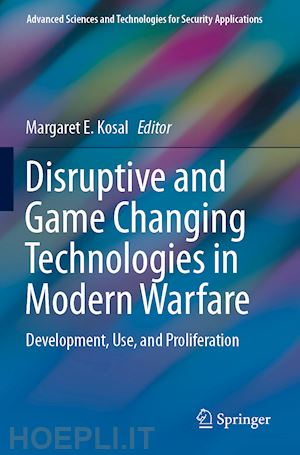
Questo prodotto usufruisce delle SPEDIZIONI GRATIS
selezionando l'opzione Corriere Veloce in fase di ordine.
Pagabile anche con Carta della cultura giovani e del merito, 18App Bonus Cultura e Carta del Docente
This book explores and analyzes emerging innovations within today’s most cutting-edge science and technology (S&T) areas, which are cited as carrying the potential to revolutionize governmental structures, economies, and international security. Some have argued that such technologies will yield doomsday scenarios and that military applications of such technologies have even greater potential than nuclear weapons to radically change the balance of power. As the United States looks to the future – whether dominated by extremist groups co-opting advanced weapons in the world of globalized non-state actors or states engaged in persistent regional conflicts in areas of strategic interest – new adversaries and new science and technology will emerge. Choices made today that affect science and technology will impact how ably the US can and will respond. Chapters within the book look at the changing strategic environment in which security operations are planned and conducted; how these impact science and technology policy choices made today; and predictions of how science and technology may play a beneficial or deleterious role in the future. Some game changing technologies have received global attention, while others may be less well known; the new technologies discussed within this proposal, as well as future discoveries, may significantly alter military capabilities and may generate new threats against military and civilian sectors.
Acknowledgements.- Introduction.- Game-Changing Military Technologies: Adoption and Governance.- Emerging Life Sciences: New Challenges to Strategic Stability.- Additive Manufacturing (AM) and Weapons of Mass Destruction (WMD) Proliferation; A. Conant.- Machine Learning and Artificial Intelligence in the Counter-Weapons of Mass Destruction Fight. Development and Deployment of Directed Energy Non-Lethal Weapons (NLWs).- Disruptive Energy Technologies and Military Capabilities.- Metamaterials – Threat to the Global Status Quo?.- Attempting to Predict the Proliferation of Lethal Autonomous Weapons Systems; S. Schmitt.- Protecting Aviation and Enabling Military Dominance Through Disruptive Innovation.- Revisiting the Revolution in Military Logistics: Technological Enablers Twenty Year On.- Conclusions and Recommendations.
Margaret E. Kosal, is committed to actively bridging the scholarly-policy divide through cutting-edge research relevant to the policy arena. Kosal is Associate Professor in the Sam Nunn School of International Affairs at Georgia Institute of Technology, where she is the Director of the Sam Nunn Security Program and the Program on Emerging Technology and Security. She was recently appointed faculty in the Parker H. Petit Institute for Bioengineering and Bioscience at Georgia Tech. Her research explores the relationships among technology, strategy, and governance. She focuses on two, often intersecting, areas: reducing the threat of weapons of mass destruction (WMD) and understanding the geopolitics of emerging technologies. She is the author of Nanotechnology for Chemical and Biological Defense, which explores scenarios, benefits, and potential proliferation threats of nanotechnology and other emerging sciences, and she is the editor of Technology and the Intelligence Community: Challenges and Advances for the 21st Century, which analyzes technology’s roles historically in the intelligence community and considers the perils and promises of emerging technologies. Formally trained as an experimental scientist, Kosal earned a doctoral degree in Chemistry from the University of Illinois at Urbana-Champaign (UIUC) working on biomimetic and nano-structured functional materials. She is also the co-founder of a sensor company, where she led research and development of medical, biological, chemical sensors and explosives detection.
During academic year 2016-2017, she served as a Senior Adjunct Scholar to the Modern War Institute at West Point. Kosal previously has served as a Senior Advisor to the Chief of Staff of the U.S. Army, as Science and Technology Advisor within the Office of the Secretary of Defense (OSD), and as an Associate to the National Intelligence Council (NIC), in addition to other consulting. She has been recognized for herleadership across the U.S. federal government, specifically for efforts to coordinate across the DoD as part of the interagency Nonproliferation and Arms Control Technology Working Group, reporting to the National Security Council, and as member of the interagency federal group charged with leading the National Nanotechnology Initiative (NNI). Kosal was nominated to and led the US involvement in the NATO Nanotechnology for Defense Working Group. She is the recipient of multiple awards including the Office of the Secretary of Defense Award for Excellence and most recently honored as Georgia Power Professor of Excellence in Fall 2017. In January 2017, she was appointed the Editor-in-Chief of the Cambridge University Press journal, Politics and the Life Sciences. She has lectured widely internationally, including invited briefs to the Organisation for the Prohibition Chemical Weapons (OPCW) in The Hague, the United Nations Interregional Crime and Justice Research Institute(UNICRI), and the United Nations Office for Disarmament Affairs (UNODA).Internationally, she has advised the OPCW on emerging technologies. In spring 2010, the PI was the only US academic selected to participate in a series of United Nations meetings aimed to scan the horizon for developments and assess risks and responses in the technology fields of synthetic biology and nanobiotechnology.










Il sito utilizza cookie ed altri strumenti di tracciamento che raccolgono informazioni dal dispositivo dell’utente. Oltre ai cookie tecnici ed analitici aggregati, strettamente necessari per il funzionamento di questo sito web, previo consenso dell’utente possono essere installati cookie di profilazione e marketing e cookie dei social media. Cliccando su “Accetto tutti i cookie” saranno attivate tutte le categorie di cookie. Per accettare solo deterninate categorie di cookie, cliccare invece su “Impostazioni cookie”. Chiudendo il banner o continuando a navigare saranno installati solo cookie tecnici. Per maggiori dettagli, consultare la Cookie Policy.